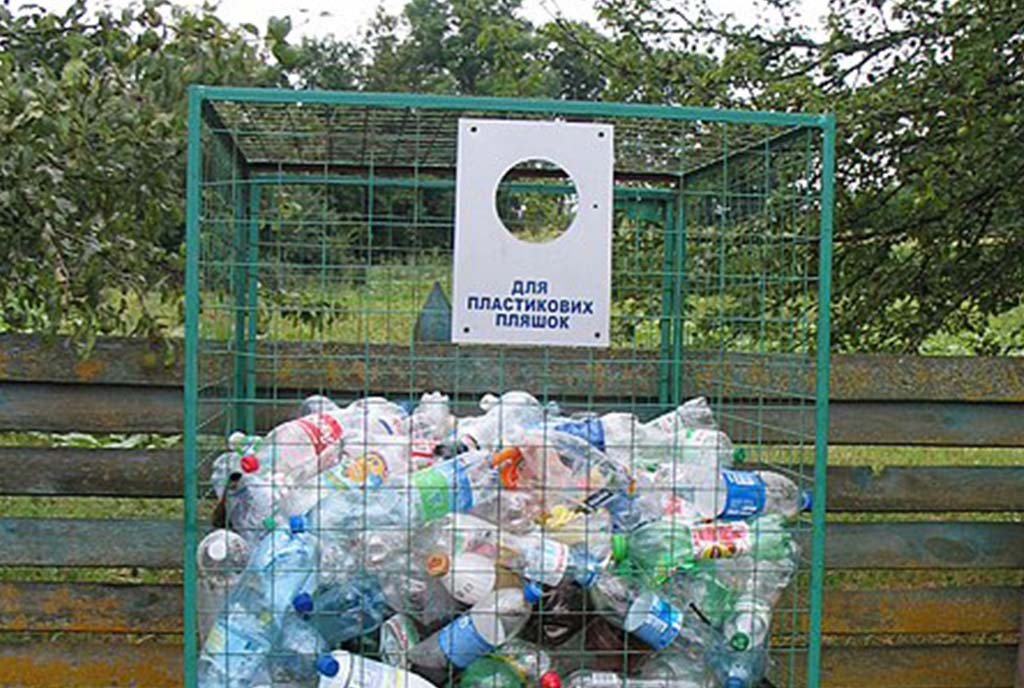
In Dnipro, Ukraine, just 50 miles from the frontlines, something is happening in the forests. Volunteers are collecting waste and discarded material as part of Underground Dnipro, an environmental activism organization working to educate civilians and the local government on the environmental impacts of pollution and why it still matters in a time of war.
Russia’s invasion of Ukraine two years ago caused catastrophic damage to the country’s environment. Ukraine’s Ministry of Environmental Protection has estimated there have been more than 2,500 environmental crimes in the country since the start of the war—a number that continues to rise. These crimes include fires, destruction of habitats and wildlife, and damage to protected ecosystems.
Even with a population of one million, the city had only a handful of recycling centers before the war.
The effects of war are deeply felt in eastern Ukraine, a place that has been plagued by 10 years of Russian brutalities. The Zaporizhzhia Nuclear Power Plant, the largest in Europe, has been occupied since the early days of the current war. Attacks in neighboring Dnipro are more common than in the capital city, Kyiv, or Lviv, in the west. With every new attack on Dnipro, the military and first responders are forced to clean up in its aftermath. But the work of cleaning up forests and recycling materials lies in the hands of Underground Dnipro.
Overflowing Landfills
Dnipro had never been a clean city. As one of Ukraine’s most important industrial centers, metalworking and mechanical engineering are two common professions. Even with a population of one million, the city had only a handful of recycling centers before the war, and environmental consciousness was not a major concern for many of its residents.
Throughout Ukraine, “landfills are overflowing and life-threatening,” according to the Kyiv Post, which wrote of the country’s 6,107 legal landfills and 26,610 illegal dumps: “most of them can’t hold any more waste and don’t meet safety standards, posing great harm to the environment and public health.”
In 2019, Alexander Grechka founded Underground Dnipro. He started simply by setting out sorting bins for four distinct types of raw materials (paper, plastic bottles, aluminum, and glass) as the first steps toward creating a sustainable and eco-friendly community. At the time, Grechka said, “No one thought that this project would be able to live and continue to work; no one believed in the idea itself. A lot of people looked at me like I was crazy.”
Over the next two years, Underground Dnipro garnered more of a following. Collaborating with another environmental organization in the city, Underground Dnipro outgrew its basement location and expanded to a large distribution center. Weekly drop-offs by locals became more routine, and the sorted products were collected by recycling companies and government entities that then condensed the material.
“I still had a project and hoped for it. I didn’t want to give up.”
Grechka had intended to expand Underground Dnipro even more, grow its outreach, and attract new volunteers. Eventually, he wanted to launch the project in other regions of Ukraine, helping the country reduce pollution and move toward a greener future. But everything changed on February 24, 2022, when Russia launched its full-scale invasion of Ukraine.
The Project Continues
That was the day Grechka had planned to open the larger recycling center. Instead, Russia’s sudden, violent attack left Ukraine and Underground Dnipro at a standstill. Initially, many Ukrainians thought they could weather the storm of the invasion at home, that it would pass in a matter of days as it had in 2014 when Russia launched the initial phase of its invasion of Ukraine.
As the realities of a prolonged war began to unfold, tens of thousands started to flee their homes, many seeking refuge in Europe. Entire Ukrainian cities fell to Russian occupation. During the chaos, Dnipro became a crucial humanitarian aid hub. Volunteers set up bases where they would collect critically needed supplies to bring to frontline towns, and doctors worked tirelessly to tend to the needs of those who had been injured in missile attacks.
Even as entire families left Dnipro for safer regions and Russian fighter jets soared overhead, Grechka recalled that he “couldn’t leave Dnipro, even despite the danger—because I still had a project and hoped for it. I didn’t want to give up. And my family said they would not go anywhere without [me].”
Sign up for our free newsletters
Subscribe to NPQ's newsletters to have our top stories delivered directly to your inbox.
By signing up, you agree to our privacy policy and terms of use, and to receive messages from NPQ and our partners.
From the first day of the war, Grechka worked as a volunteer. He collected scrap material from the recycling center and molded it into trench candles, which could be used to bring light and warmth to the soldiers fighting in the frontline trenches. By the third week of the war, Grechka decided to reopen the recycling center after residents who remained in the city kept asking for a place to recycle.
As time passed and more people moved back to Dnipro, the center remained open. Although fewer than 10 full-time volunteers are currently with Underground Dnipro, the center is used by up to 2,000 people a month who drop off their recycling. Over the course of one month, Underground Dnipro collects between one to two tons of material to bring to processing sites.
No Constant Funding, No Cover
Underground Dnipro has no constant funders. Instead, they have a few independent donors who give money when they can or donate machines and devices needed to continue the project. But the group also generates money by taking their masses of material to be processed. That money, in turn, is used to pay the rent on their center.
In addition to the operating the center, Underground Dnipro and a team of 10 to 100 volunteers venture into the nearby forests twice a month to collect discarded trash and recyclable items, like plastic water bottles and scraps of metal.
[Working in nature] leaves the Underground Dnipro volunteers exposed to potential raids.
Russia’s bombing has left the Ukrainian landscape littered with rubble, the remains of shelled houses and buildings. As the United Nations Development Programme wrote, “Ukraine simply does not have the landfill space to be able to throw everything away.”
The woods have fared no better. As Grist reported, 57,000 acres have burned after fires started by shelling—about a third of the country’s total forests. The remaining trees are surrounded by trash: debris dumped by construction trucks and items discarded by soldiers or people fleeing the conflict.
The Underground Dnipro volunteers work in the open, without shelter, or only under the cover of trees. This leaves them exposed to potential raids, without buildings or underground bunkers to wait them out.
Underground Dnipro Coordinator Iryna Mastiuk said, “It’s a huge risk, but we plan the area where we clean. We also think of the safety of the people.” Many volunteers continue to do the work out of a desire to help clean up their homes.
To mitigate the dangers, the International Red Cross plays a crucial role by dispatching members to accompany Underground Dnipro during their forest excursions. Each volunteer is taught the initial steps of first aid and what items to avoid, like anything that could be an unexploded ordnance. There have been no near brushes with fate or injuries; Mastiuk said that many of the volunteers care deeply about protecting the natural world and want to help despite the risks involved.
There is no set age range for volunteers, although Mastiuk said the majority tend to be college students in their early twenties. Some are as young as 16—like Sofiia Harakava, who has been a volunteer with Underground Dnipro since last summer. “We are together in the team,” Harakava said. “We have a lot of enthusiasm. And it was really pleasant to see Gen Z stand up.”
According to Harakava, the number of young people she volunteers with “shows a new generation of Ukrainians that are really trying hard to make their country a better place, even when the war is happening.”













